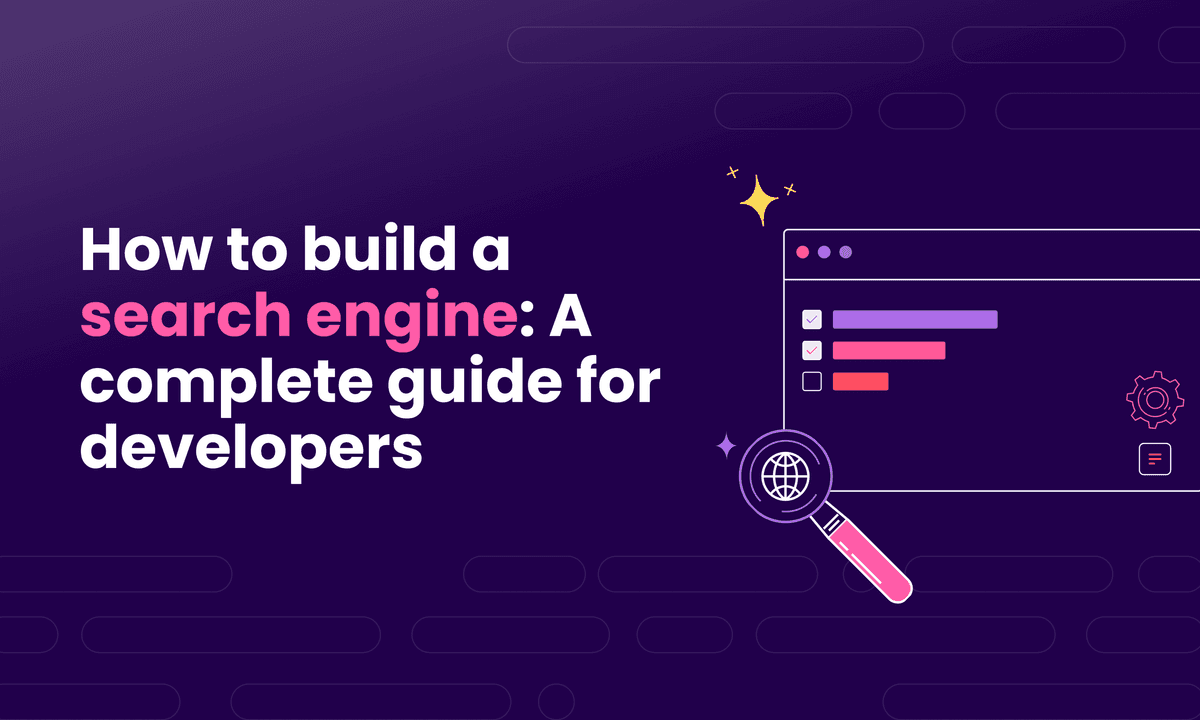Algolia vs Elasticsearch (vs Meilisearch): Which search solution actually fits your needs in 2025?
Algolia vs Elasticsearch comparison: Premium managed service vs open-source flexibility. Explore Meilisearch as the balanced alternative.
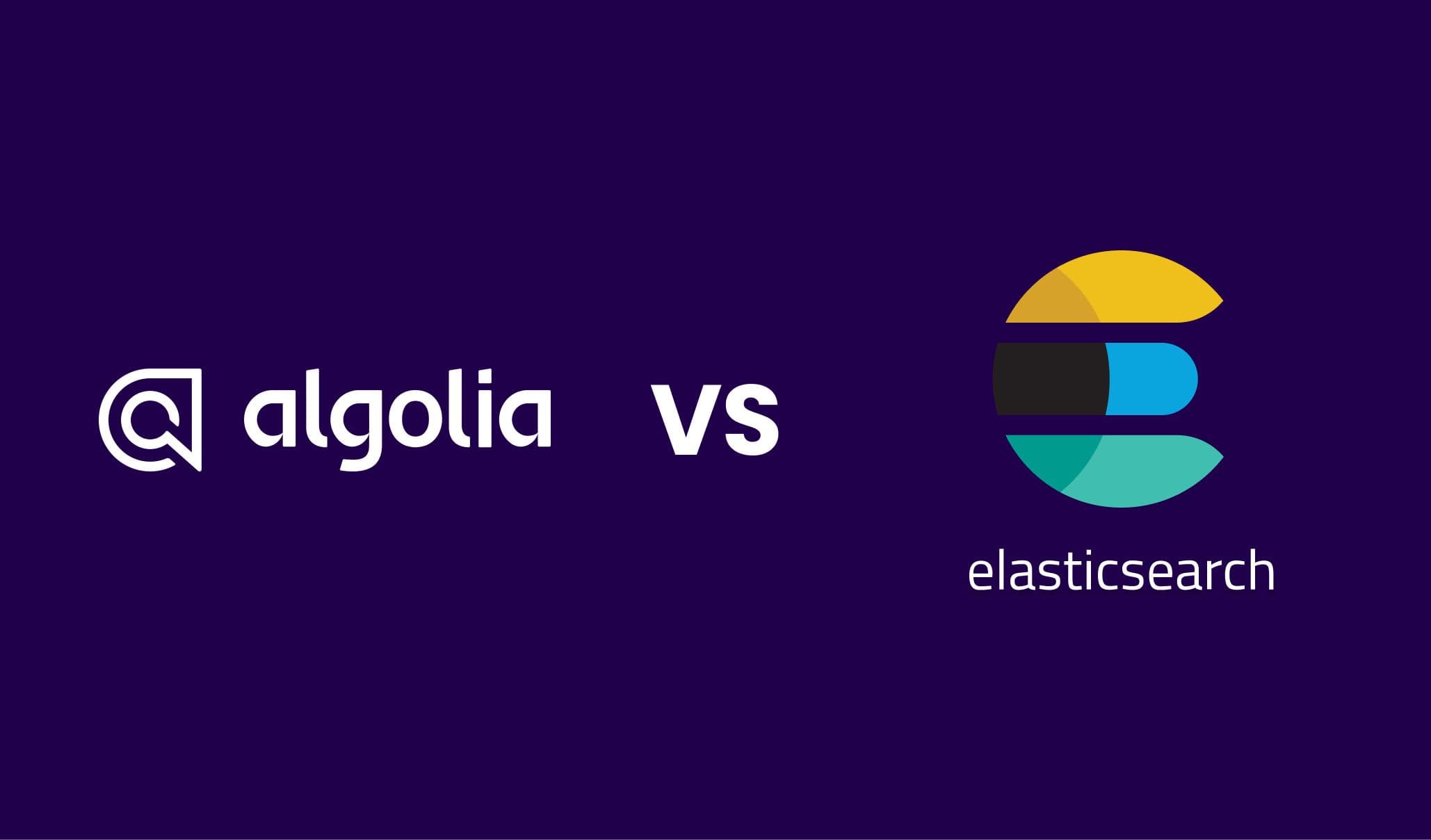
In this article
If you're comparing Algolia vs Elasticsearch for your search needs, you're likely wrestling with a fundamental trade-off: do you prioritize the convenience and features of a managed search service, or the control and flexibility of an open-source solution? It's a decision that impacts not just your budget, but your entire development workflow, operational overhead, and ultimately, your users' search experience.
But here's what most comparisons miss: both Algolia and Elasticsearch represent extremes on the search solution spectrum. One requires significant financial investment, the other demands substantial technical resources. For many teams, neither extreme makes sense.
The real questions you should be asking are:
- Do you need to handle billions of documents, or will hundreds of millions suffice?
- Is your team prepared to manage complex distributed systems, or do you need something that just works?
- Can you justify spending hundreds or thousands per month on search, or do you need a more cost-effective solution?
- Do you want AI-powered search capabilities without the complexity of building them yourself?
- Is search a core differentiator for your business, or a feature that needs to work reliably?
In short, here's what we recommend:
👉 Algolia is the premium search-as-a-service platform that delivers exceptional speed and relevance with minimal setup. Its AI-powered NeuralSearch and comprehensive merchandising tools make it ideal for e-commerce companies where search directly drives revenue. With results delivered in under 100ms and 99.999% uptime guarantees on premier plans, it's a robust solution. However, the usage-based pricing model can quickly escalate, making it expensive for startups and projects with large datasets or high query volumes.
👉 Elasticsearch is a powerful open-source search engine that can handle virtually any scale and complexity. Built on Apache Lucene, it excels at full-text search, log analytics, and complex aggregations across petabytes of data. Its distributed architecture and rich ecosystem make it suitable for enterprise-scale deployments. The trade-off is significant operational complexity, requiring dedicated expertise to manage clusters, handle scaling, and prevent issues like split-brain scenarios. The learning curve is steep, and the resource requirements (especially memory) can drive up infrastructure costs.
Both platforms are undeniably powerful. But they represent two extremes: Algolia's premium pricing can strain budgets, while Elasticsearch's operational complexity can overwhelm teams. What if there was a middle path that combined the best of both worlds?
👉 Meilisearch is the open-source search engine that prioritizes developer experience and simplicity without sacrificing performance. Written in Rust for exceptional speed (under 50ms response times), it delivers relevant results out of the box with features like typo tolerance enabled by default. The recent addition of AI-powered hybrid search brings semantic understanding to your searches without the complexity. With a free open-source version for self-hosting and cloud plans offering both subscription-based and resource-based pricing options, it's accessible to projects of all sizes while providing the flexibility to choose the pricing model that best fits your needs. While the Community Edition handles hundreds of millions of documents with ease, the Enterprise Edition adds multi-node capabilities for even larger scales, making it suitable for a wide range of applications.
If you're looking for a search solution that's powerful yet simple, fast yet affordable, see how Meilisearch can transform your search experience with a 14-day free trial.
Algolia vs Elasticsearch vs Meilisearch at a glance
| Algolia | Elasticsearch | Meilisearch | |
|---|---|---|---|
| Architecture | ⭐⭐⭐⭐⭐ Fully managed cloud service | ⭐⭐⭐ Distributed, requires cluster management | ⭐⭐⭐⭐ Single-node (Community) or multi-node (Enterprise) |
| Setup time | ⭐⭐⭐⭐ Hours with API integration | ⭐⭐ Days to weeks for production | ⭐⭐⭐⭐⭐ Minutes to hours |
| Performance | ⭐⭐⭐⭐⭐ <100ms response time | ⭐⭐⭐⭐ Fast but depends on configuration | ⭐⭐⭐⭐⭐ <50ms response time |
| Scalability | ⭐⭐⭐⭐⭐ Automatic cloud scaling | ⭐⭐⭐⭐⭐ Petabyte-scale with complexity | ⭐⭐⭐⭐ Hundreds of millions (Community) to billions (Enterprise) |
| Learning curve | ⭐⭐⭐ Moderate for advanced features | ⭐⭐ Steep, requires specialized knowledge | ⭐⭐⭐⭐⭐ Gentle, works out-of-the-box |
| Cost (starting) | Free tier + pay-as-you-go | Free (open-source) + infrastructure | Free (open-source) or flexible cloud pricing |
| AI/ML features | ⭐⭐⭐⭐⭐ Advanced NeuralSearch | ⭐⭐⭐⭐ Machine learning capabilities | ⭐⭐⭐⭐ Hybrid search with semantic understanding |
| Typo tolerance | ⭐⭐⭐⭐⭐ Excellent, configurable | ⭐⭐⭐ Available but requires configuration | ⭐⭐⭐⭐⭐ Enabled by default |
| Best for | E-commerce, enterprise with budget | Large-scale, complex requirements | Most projects prioritizing simplicity |
Understanding the fundamental trade-offs
The search solution landscape is defined by a series of trade-offs that fundamentally shape your technical architecture and operational model.
Algolia represents the fully managed approach. You're essentially outsourcing not just the infrastructure but the entire complexity of running a search engine. This includes automatic scaling, security updates, and performance optimization. The platform handles 1.75 trillion searches annually across 17,000+ customers, demonstrating its reliability at scale. But this convenience comes with vendor lock-in and premium pricing that scales with usage.
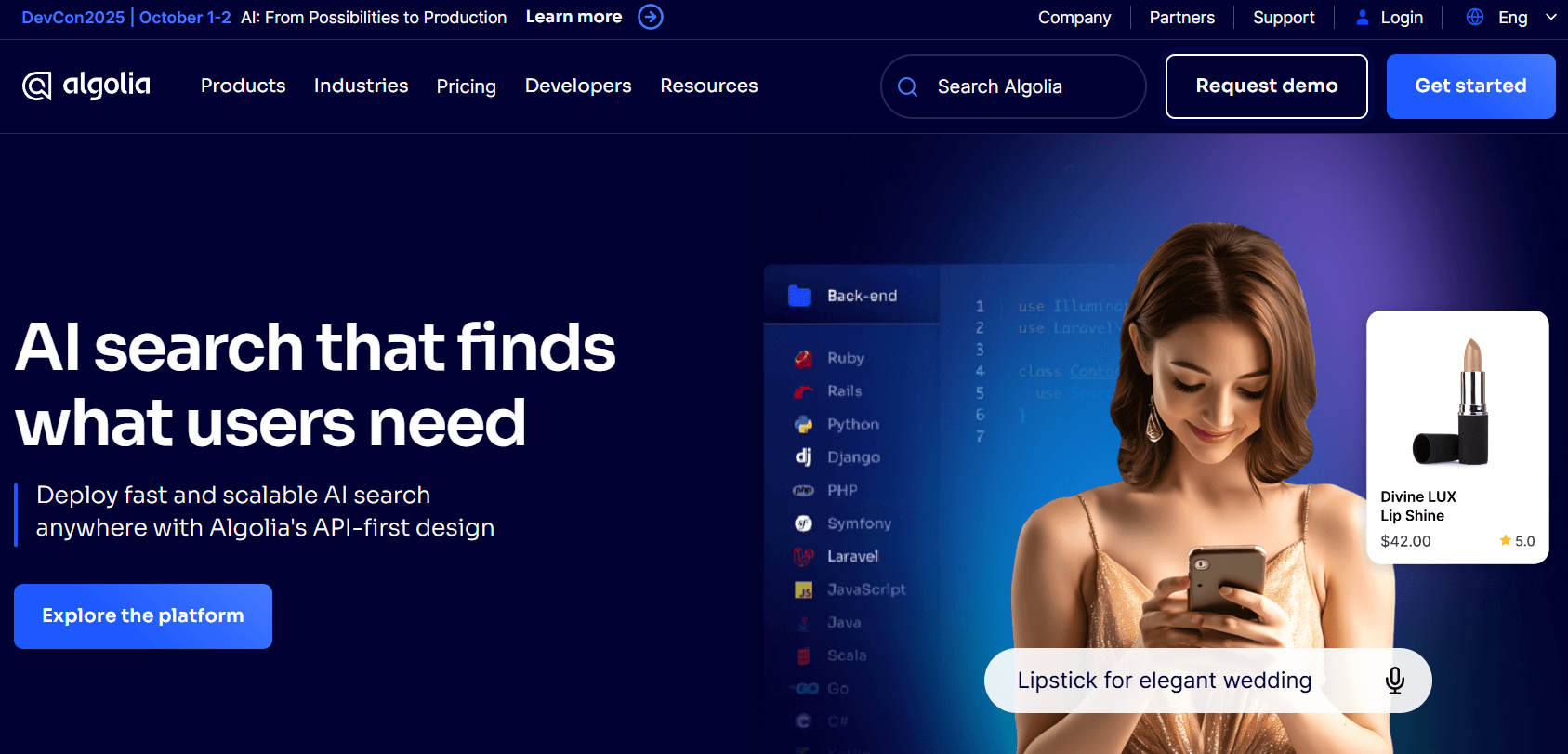
Elasticsearch embodies flexibility and control. While it's available as open-source software for self-hosting, Elastic also offers a managed cloud service. When self-hosted, you get complete control over every aspect of your search infrastructure, from shard allocation to query optimization. This flexibility enables use cases far beyond search, including log analytics, security information management (SIEM), and business analytics. The price of this flexibility is operational complexity that often requires dedicated expertise.
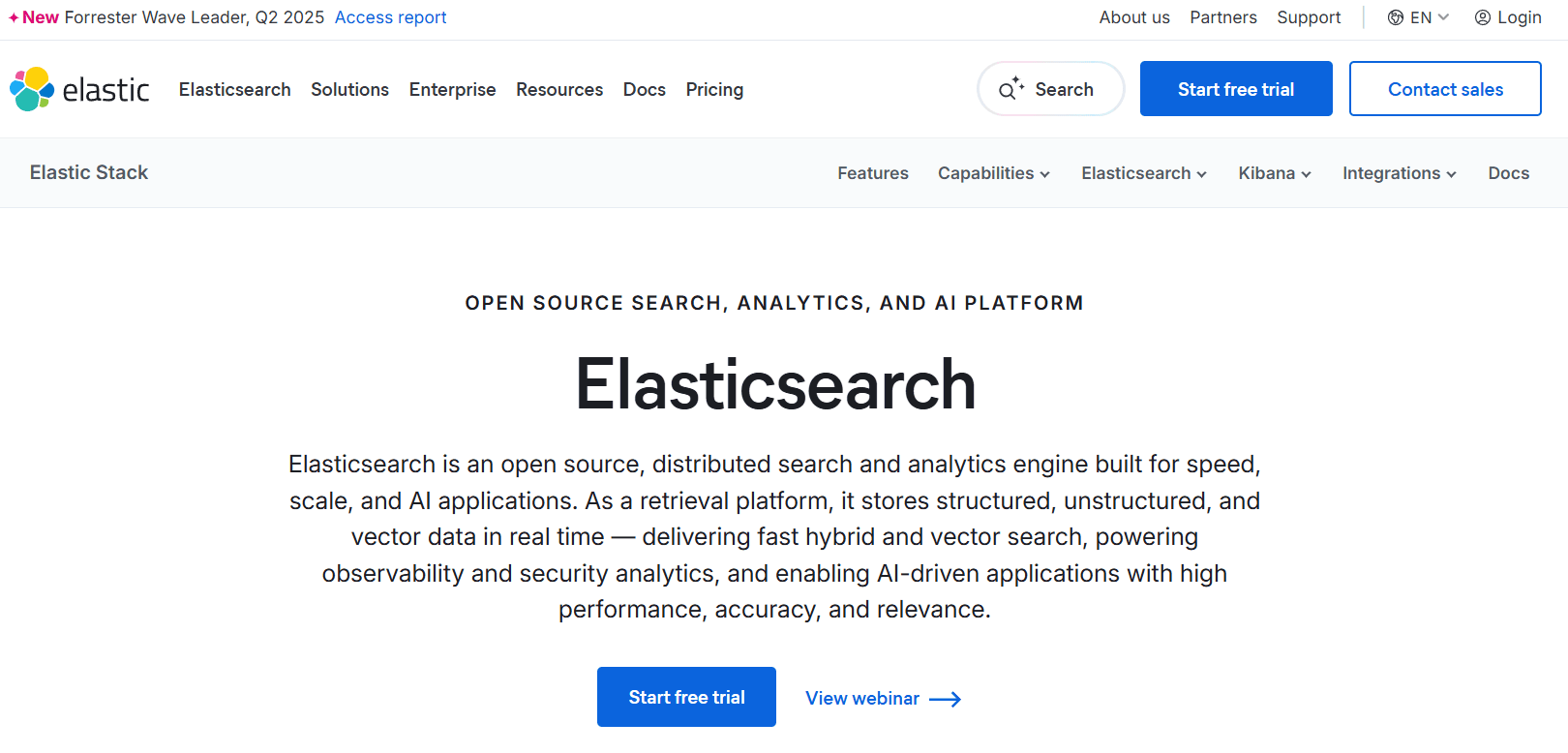
Meilisearch strikes a deliberate balance. The Community Edition is designed to be self-hostable like Elasticsearch but with the simplicity approaching that of a managed service. Its single-node architecture eliminates the complexities of distributed systems while still delivering performance that rivals or exceeds both alternatives for most use cases.
For cloud deployments, Meilisearch offers unique flexibility with both subscription-based and resource-based pricing models, allowing organizations to choose the approach that best fits their scale and predictability needs. For organizations needing greater scale, the Enterprise Edition introduces multi-node capabilities while maintaining the platform's focus on simplicity.
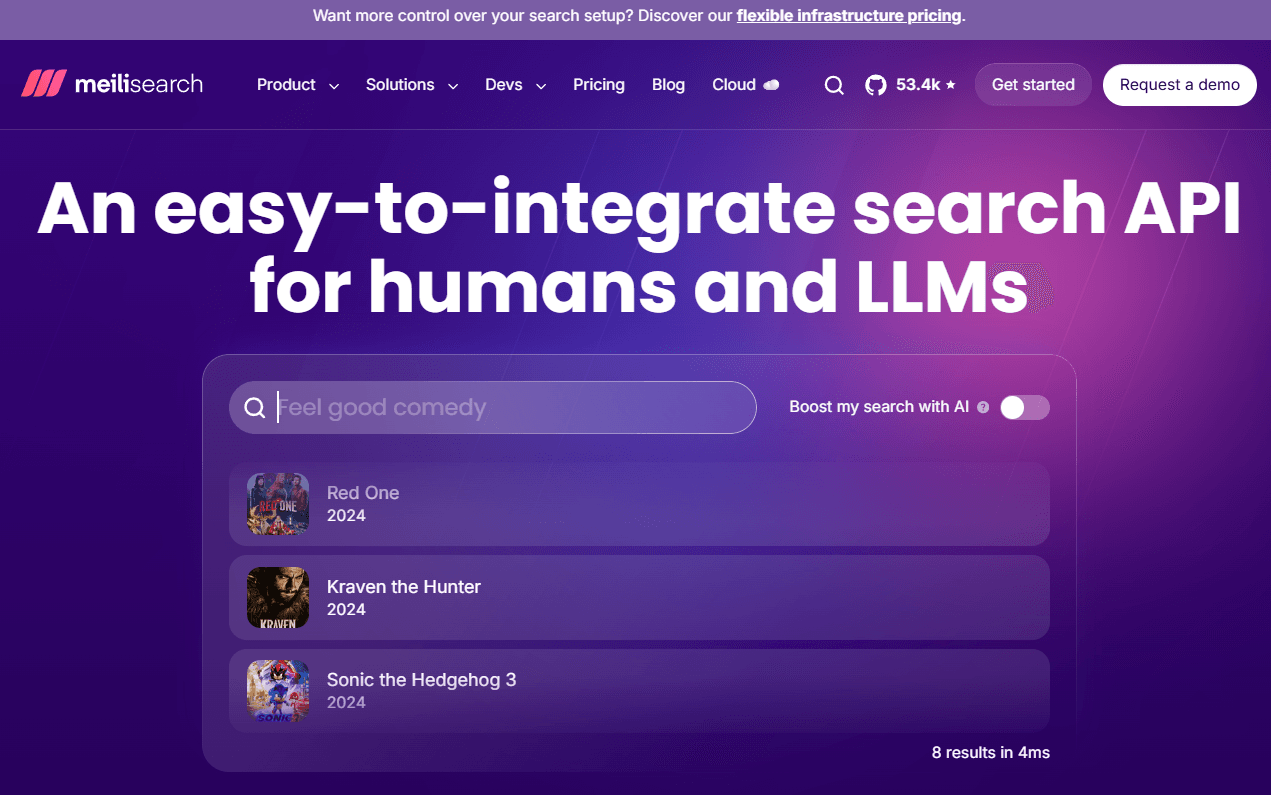
Performance and speed across different scales
Raw performance metrics only tell part of the story. The real question is performance at your specific scale and use case.
Algolia's distributed search network (DSN) spans 70+ data centers globally, ensuring sub-100ms response times regardless of user location. The platform maintains a 99.999% uptime SLA for enterprise customers with the Premier Platform Availability add-on. This is genuinely impressive, but you're paying for this global infrastructure whether you need it or not.
Elasticsearch's performance is highly variable based on your configuration and expertise. A well-tuned cluster can deliver fast response times across large datasets, with some deployments successfully managing petabyte-scale data. However, achieving optimal performance requires understanding concepts like heap sizing, shard allocation, and query optimization. Poor configuration can lead to slow queries, memory issues, and cluster instability.
Meilisearch consistently delivers sub-50ms search responses with minimal configuration. Built in Rust for maximum performance, it achieves this speed through efficient data structures like finite state transducers (FST) and a Lightning Memory-Mapped Database (LMDB) storage engine. While it can't match Elasticsearch's petabyte-scale capabilities, it handles hundreds of millions of documents with the Community Edition, and the Enterprise Edition extends this further, covering the vast majority of real-world applications.
The real cost of search (it's not just the subscription)
When evaluating search solutions, the subscription fee is just the tip of the iceberg.
Algolia's costs include:
- Free Build tier with limited usage
- Pay-as-you-go Grow tier ($0.50 per 1,000 searches, $0.40 per 1,000 records)
- Premium and Elevate plans with custom pricing
- Overage charges that can escalate quickly
- Limited control over cost optimization
- Vendor lock-in making migration expensive
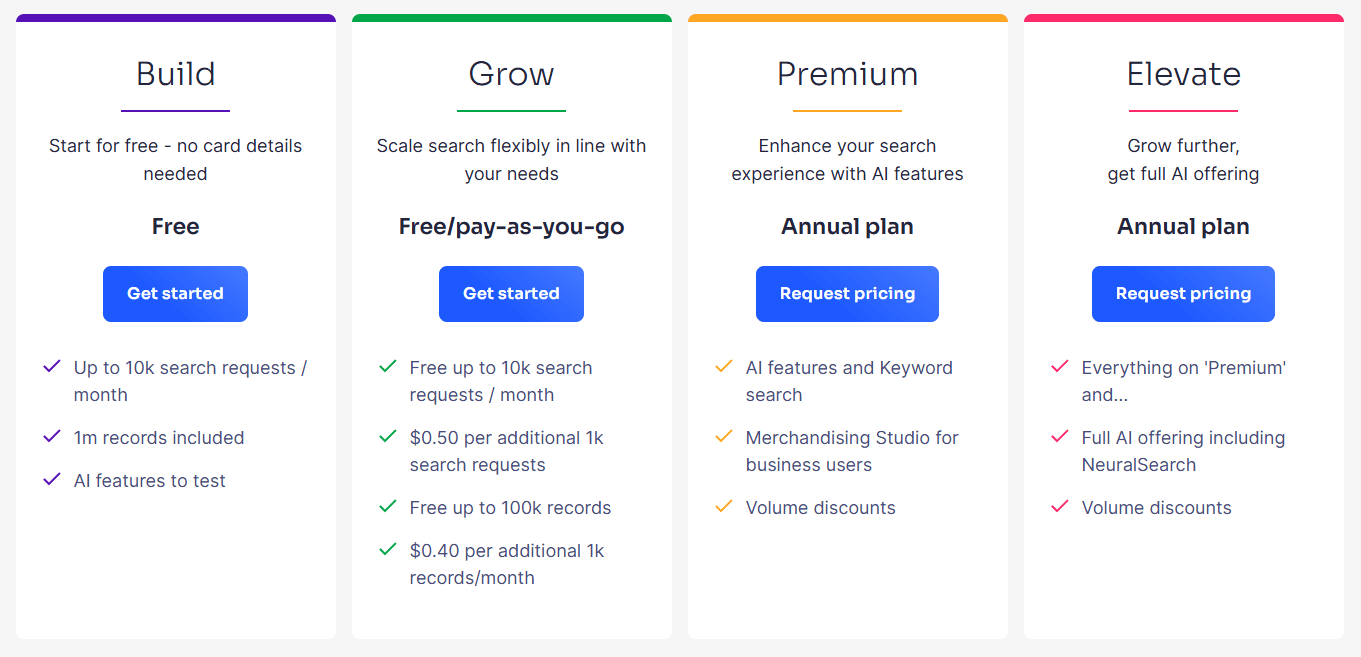
Elasticsearch's hidden costs encompass:
- Infrastructure (often memory-intensive, requiring high-spec servers)
- Operational expertise (DevOps engineers familiar with Elasticsearch)
- Monitoring and management tools
- Backup and disaster recovery systems
- Time spent on cluster management and troubleshooting
- Training and documentation
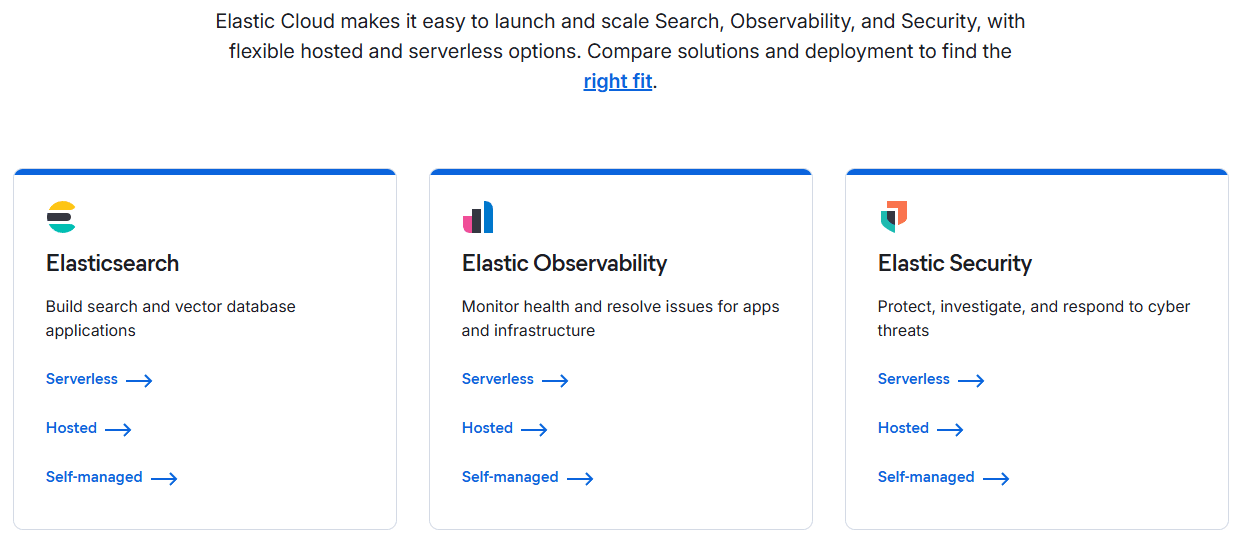
Meilisearch's total cost remains predictable:
- Free open-source version for self-hosting
- Cloud plans with flexible pricing: choose between subscription-based plans starting from $30/month or resource-based pricing for greater predictability at scale
- Resource-based pricing option eliminates surprise overages, providing cost control for growing applications
- Lower infrastructure requirements due to efficient architecture
- Minimal operational overhead due to simplicity
- Quick onboarding reducing development costs
- Transparent pricing with both models, allowing you to switch based on your needs
For many startups and SMBs, Meilisearch delivers significant cost savings compared to Algolia while requiring substantially less operational overhead than Elasticsearch. The dual pricing model flexibility means you can start with subscription-based pricing and switch to resource-based as you scale, or choose the model that best fits your usage patterns from day one.
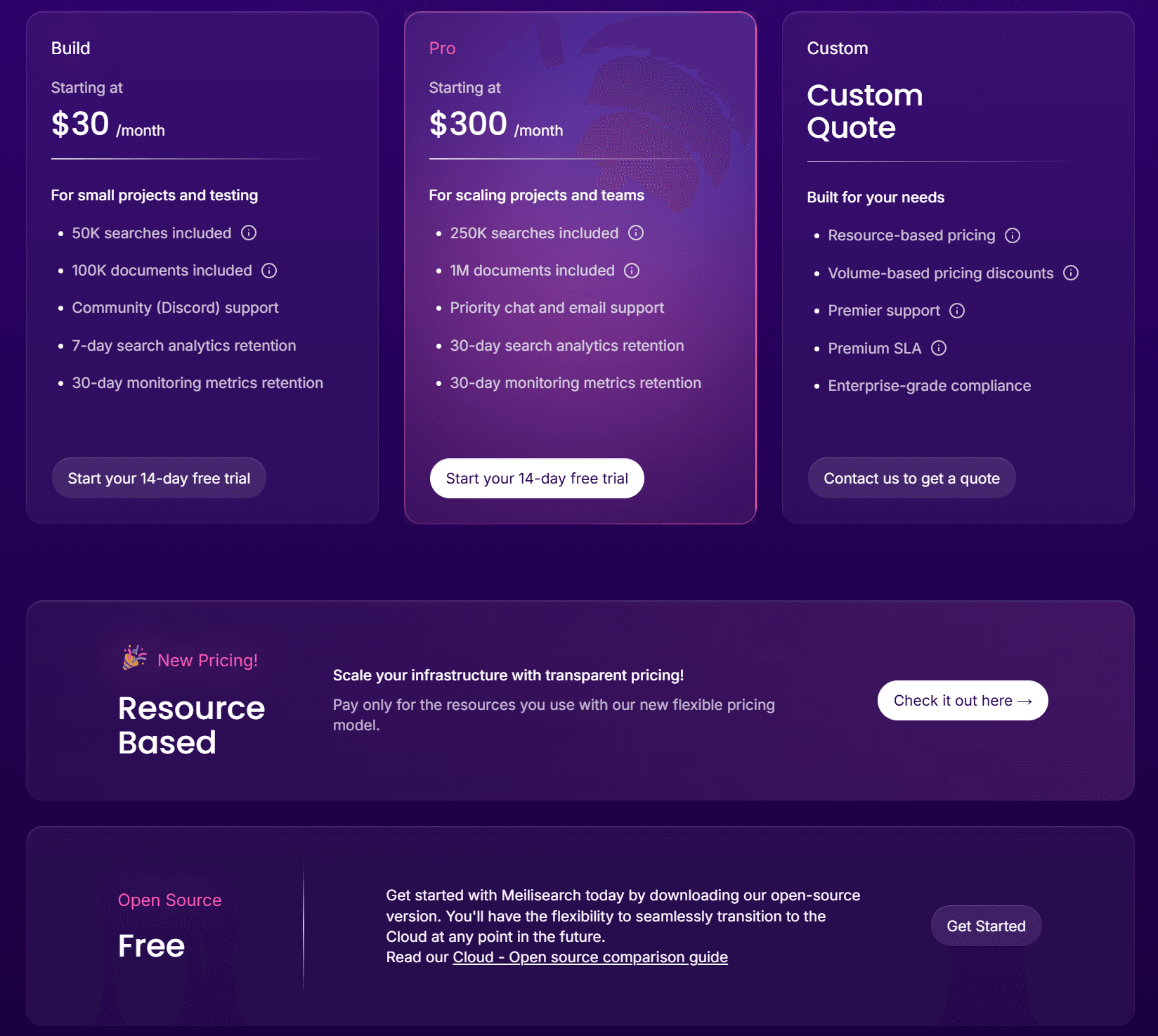
AI-powered search capabilities compared
The integration of AI into search is no longer optional for modern applications. Users expect search to understand intent, not just match keywords.
Algolia leads with their NeuralSearch technology, combining keyword and vector search through neural hashing. They offer automated synonym suggestions, query categorization, and AI-powered personalization. The platform's strength lies in making these advanced capabilities accessible through simple API calls. While the full AI suite is featured prominently in their Elevate plan (custom pricing), some AI capabilities like Dynamic Synonyms are also available on the Premium tier.

Elasticsearch provides machine learning capabilities, including anomaly detection, classification, and natural language processing. You can deploy models from Hugging Face and implement semantic search through vector similarity. The challenge is that implementing these features requires significant expertise and additional infrastructure for model serving.
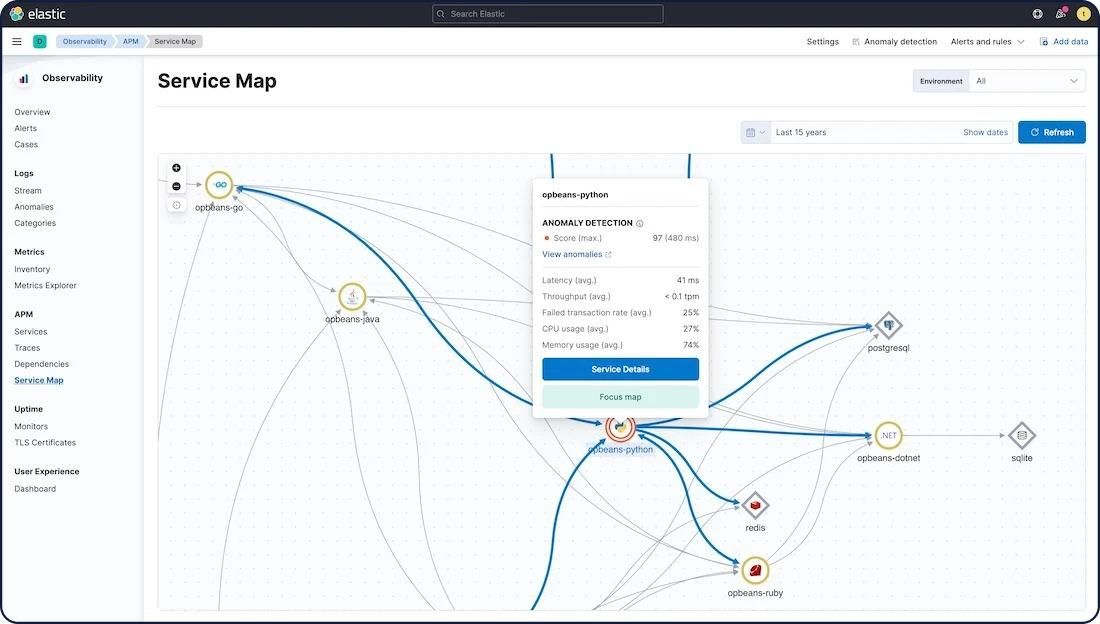
Meilisearch recently introduced hybrid search, elegantly combining traditional keyword search with semantic vector search. You can use automated embeddings from OpenAI or Hugging Face, or provide your own vectors. The brilliance is in the simplicity: one API parameter (hybrid) enables AI-powered search, and the semanticRatio parameter lets you balance keyword and semantic relevance. This makes advanced search accessible to developers without ML expertise.
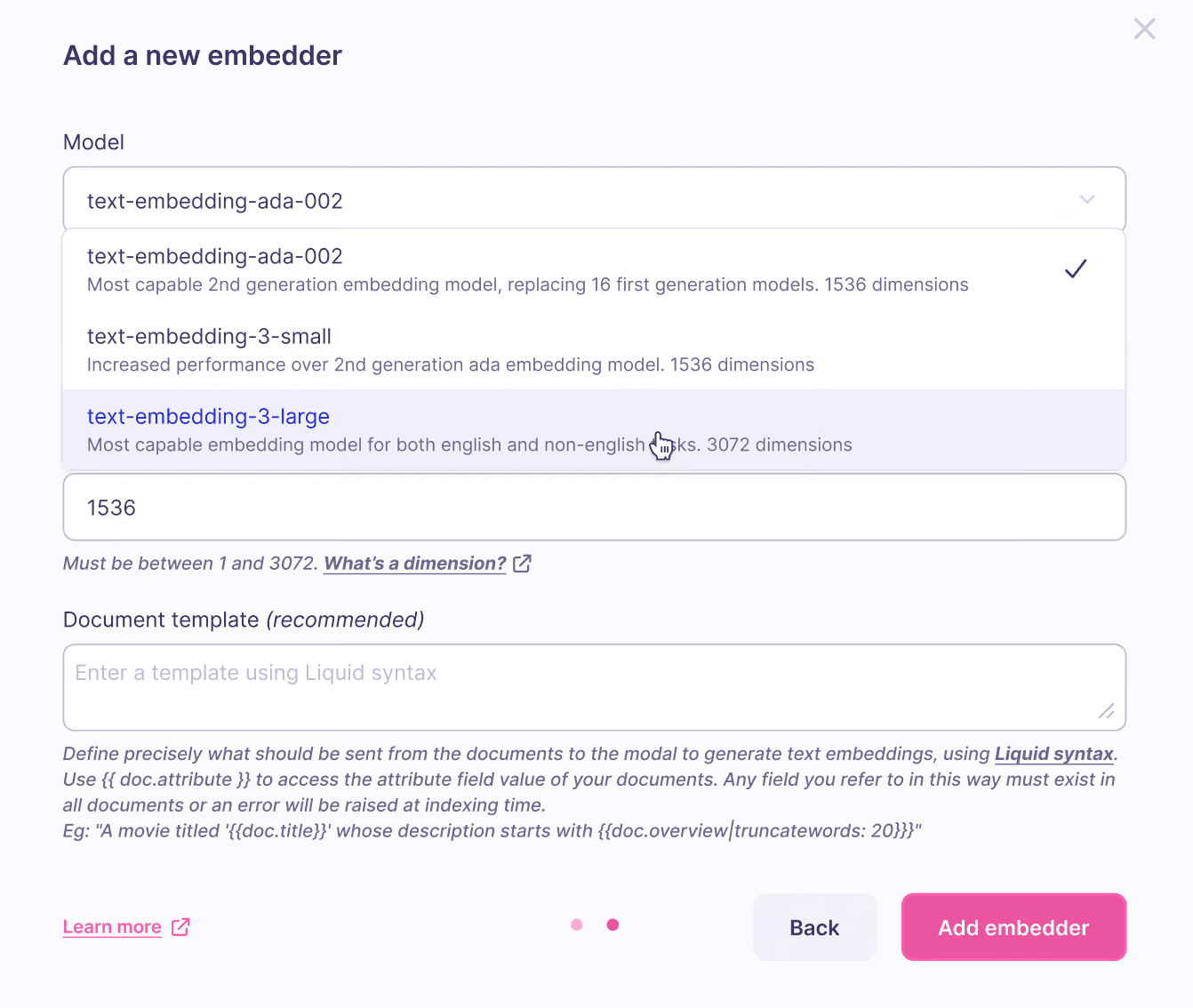
Developer experience and time to production
The speed at which you can go from concept to production search is crucial for modern development cycles.
Algolia offers a polished developer experience with comprehensive documentation and SDKs for major languages. However, the learning curve steepens when you need to customize beyond the basics. Deep customization of ranking algorithms and understanding the tie-breaking ranking system requires time investment. The dashboard is powerful but can be complex for teams unfamiliar with search concepts.
Elasticsearch has extensive documentation, but the learning curve is notoriously steep. Setting up a production-ready cluster requires understanding node roles, shard allocation, index mappings, and cluster health. The Query DSL is powerful but complex. The Dev Tools console in Kibana helps, but it's primarily designed for technical users.
Meilisearch prioritizes developer happiness above all else. You can have a working search in literally minutes. The RESTful API is intuitive, the default settings are sensible, and features like typo tolerance work out-of-the-box. The documentation emphasizes clarity and simplicity. Most developers report being productive within hours, not days or weeks.
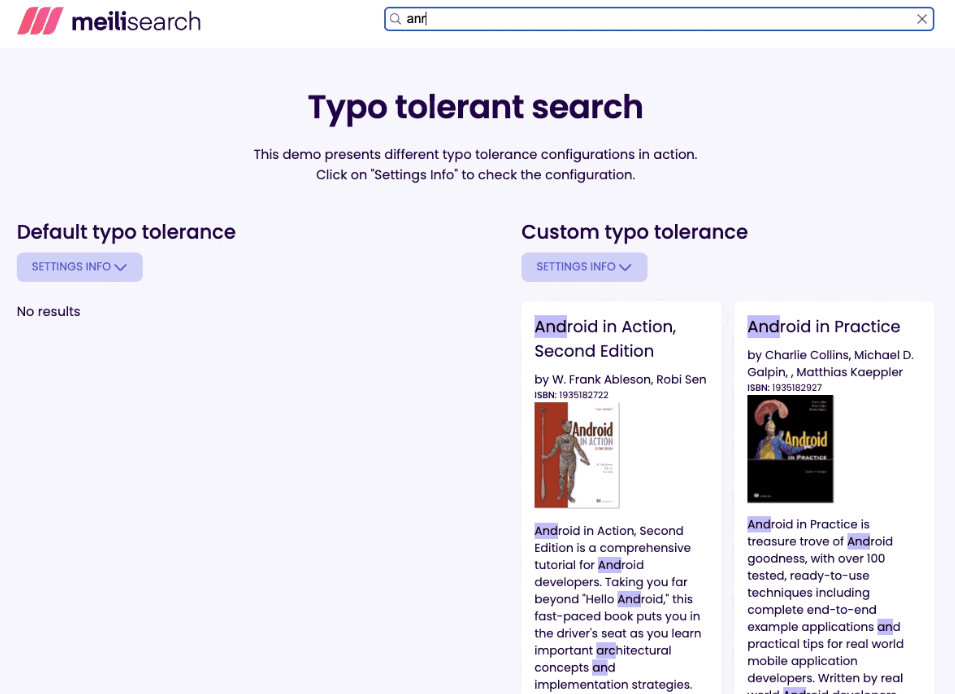
When complexity becomes a liability
There's a point where additional features and capabilities become counterproductive.
Algolia's feature richness can overwhelm smaller teams. With dozens of API parameters and complex pricing calculations, teams often use only a fraction of available features while paying for the full platform. The black-box nature of some algorithms makes debugging difficult when results don't match expectations.
Elasticsearch's operational complexity is its Achilles' heel. Split-brain scenarios, heap pressure, mapping explosions, and shard allocation issues are just some of the documented problems that can bring down a cluster. The distributed nature means more things can go wrong, and when they do, recovery requires expertise.
Meilisearch's simplicity is its strength. The Community Edition's single-node architecture eliminates entire categories of problems: no split-brain scenarios, no shard rebalancing, no complex cluster state management.
The Enterprise Edition adds multi-node capabilities for those who need them, but maintains the platform's commitment to operational simplicity. This focus doesn't mean lack of power; it means delivering fast, relevant search results without operational nightmares.
Algolia vs Elasticsearch vs Meilisearch: Which should you choose?
The choice ultimately depends on your specific requirements, resources, and priorities.
Choose Algolia if:
- You're an e-commerce company where search directly drives revenue
- You need advanced AI and merchandising features immediately
- You have the budget for premium search services
- You want zero operational overhead
- You need global infrastructure with guaranteed uptime
- Your dataset is moderate but queries are high-volume
Opt Algolia for lightning-fast, AI-powered search with zero maintenance.
Choose Elasticsearch if:
- You need to handle petabytes of data
- Search is part of a larger analytics or log management strategy
- You have dedicated DevOps resources with Elasticsearch expertise
- You need complex aggregations and analytics beyond search
- You require fine-grained control over every aspect of search
- You're building a specialized search application with unique requirements
Leverage Elasticsearch for full control, scalability, and advanced analytics.
Choose Meilisearch if:
- You want powerful search without operational complexity
- You're a startup or SMB watching costs carefully
- You need to ship search features quickly
- You want AI-powered search without the complexity
- Your dataset is under a billion documents per index (Community Edition)
- You value developer experience and simplicity
- You want the flexibility of open-source with optional cloud hosting
- You need flexible pricing options (subscription or resource-based) to match your growth trajectory
- You want predictable costs without surprise overages as you scale
- You may need multi-node scaling in the future (Enterprise Edition)
Ready to see why thousands of developers choose Meilisearch for its perfect balance of power and simplicity? Start your 14-day free trial of Meilisearch Cloud, or download the open-source version and have search running in minutes.
The search solution you choose today will shape your product's capabilities and your team's velocity for years to come. While Algolia and Elasticsearch are powerful platforms with their place in the ecosystem, Meilisearch represents a new paradigm: enterprise-grade search that doesn't require enterprise resources.
In a world where developer time is precious and user expectations are high, Meilisearch delivers what matters most: lightning-fast, relevant search that just works.
Experience search that balances power with simplicity
Don't choose between premium pricing and operational complexity. Meilisearch delivers lightning-fast search (<50ms response times), AI-powered hybrid capabilities, and typo tolerance that works out-of-the-box – all without the overhead. Whether you start with our open-source version or jump straight into the cloud, you'll have production-ready search running in minutes, not weeks.
